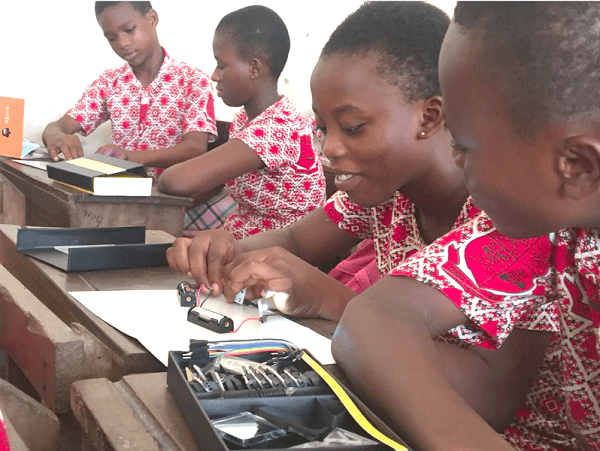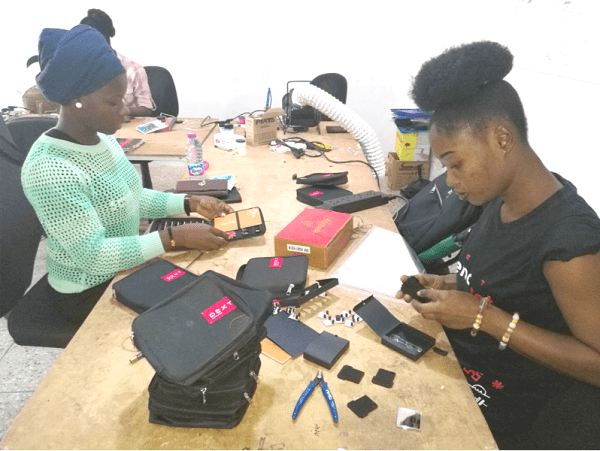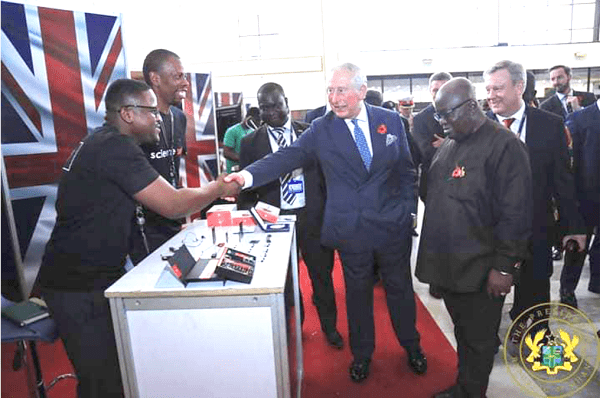
DEXT Science Set: Simplifying practical science in Ghana and beyond
From the way he reacted when he was mentioned as winner of season five of MTN Heroes of Change at the awards show held recently, it was obvious he was shocked.
Mr Charles Ofori Antipem, who was seated among the nine other finalists on the front row, stretched his neck to look at the portrait painted by artist Chuku and tapped one of the finalists close to him to find out who the winner was.
Advertisement
Each year, the winner is announced in a dramatic way: an artist paints a portrait of the winner live on stage up-side down, after which the portrait is turned upright for the audience to make the winner out.
Speaking to The Mirror earlier this week, he confirmed his shocked because to him all the other nine finalists had projects that had impacted their communities positively over the years.
“Being nominated among such heroes was an honour, and my team and I were excited about it. Earlier at the show, Ms Loiusa Enyonam Ansah emerged winner in the education category which I was part of and I never thought I would be the ultimate winner.”
Mr Antipem, 26, said winning the ultimate prize had been humbling, especially when he was told he was the youngest person to win since the award’s inception five years ago.

Mobile science lab
Together with his co-founder, Michael Asante-Afrifa, 28, they invented the DEXT Science Set, a mobile laboratory which makes teaching and learning of science easier as students are able to see and experiment with miniature science tools.
He recounts that the motive behind their invention was to redefine practical science and give students the opportunity to try their hands on what was published in books.
His father, Mr Solomon Antipem (deceased), was a science teacher and right from childhood, he (Charles) saw how his dad struggled to put materials together to explain some scientific happenings to his students.
Other Trending Stories
Back in the university, some of his colleagues visited his hometown during vacations to teach and they realised the gap between the theory and practical and decided to create something to solve the problem.
“Together with Michael, we would save some money to buy some science tools and do practical with the students. Later, we realised that was not sustainable so we came up with the idea of creating something they can use even in our absence and that is how the science set idea was birthed,” he said.
Shrinking a science lab in a box
The idea to put a complete science lab into a small box was described as ‘crazy’ by some of his peers who saw him work at the initial stage.
Even if they would be able to create the miniature lab, it had to be affordable, and that was also another hurdle to cross.

“How do you put a lab that can cost over $10,000 in a box and make it affordable for Ghanaian schools and parents as well.? The task was huge and it seemed impossible but we knew once we succeeded the impact would be great and it would transform practical science,” he state.
For six months, they researched and tried their hands on different methods till they were finally able to put together their first set.
The initial plan was put a maximum of 35 science tools in the box but by the time they were done building the first set, they had 45.
The components include a buzzer, capacitator electrolytic, series buzzer, resister, led, light detector, switch, among others.
Turn around
With the set built, they needed to show the world their invention and get people to see how it worked.
Fortunately, they came into contact with Ms Ramatu Gariba, a Science Coordinator in the Ga South District, Accra, who was passionate about science. She was fascinated by their invention and invited them to show the set to some schools in the area.
The feedback, he recounts, was good from both students and teachers and they landed their first 40 sets order from one of the schools they visited, High Class International School at Kasoa.
“Initially, some assumed we had imported the sets. They couldn’t believe they were made right here in Ghana. When we received the order, we were excited but we didn’t even know how to raise money to produce that number and how long we would take to get them ready, looking at the time we used in building the first one.”
“The agreement was that they would pay us after we have delivered the sets, so I spoke to my uncle who secured a loan of GH₵3,000. Michael also spoke to his dad, Mr Alex Asante-Afrifa, and other relatives and also raised the same amount.
“We employed our first worker, Ms Elizabeth Asare, who is currently our production supervisor, taught her how to assemble the different parts and we delivered the order within two weeks,” he narrated.
International recognitions
Although Dext Technology officially registered as a company two years ago, they have made a great impact and have received many awards and recognitions.
Their awards include the Most Innovative Education Solution in Africa, 2018, at the African Union Commission for Human Recourse Development Science and Technology; Africa Engineering Innovation Prize, 2018 by the Royal Academy of Engineering and the Scalable Young Social Enterprise Award, 2018 at the World Export Development Forum, organised by the International Trade Centre.

Others are Innovation Show Award Africa, 2017, from the American Society of Mechanical Engineers and the Engineering Excellence Award, 2016, by The Ghana Institute of Engineers.
Mr Antipem said his team had been invited to many international events where people showed high interest in their invention.
“Surprisingly, we have exported more sets to some developed countries and when we got this national recognition from MTN, we thought it was time for our own people to appreciate our product and invest in the education of our school children,” he added.
One million science sets
The winner of Season 5 of MTN Heroes of Change expressed gratitude to the MTN Foundation for the recognition and the GH₵100,000 cash prize which he believed would help them increase production and draw them closer to their one million target.
“A set costs GH₵100 and in most of the rural areas where we have visited, about four students share one, which is a good start. With more funding we can increase our production and get our sets to millions of schoolchildren across the country,” he said.
To young people who were inspired by their invention and success, Mr Antipem advised: “All the clichés we hear about working hard, staying determined, etc. are true. Our team is made of young people but we were able to this brand with God’s help, support from our families and friends and our zeal to keep working hard despite the many challenges.”




